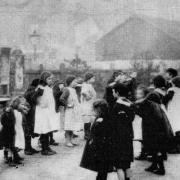A Tale of Two Cities
Published on 31st July 2013
 It was the best of times, it was the worst of times … it was the spring of hope, it was the winter of despair, we had everything before us, we had nothing before us, we were all going direct to Heaven, we were all going direct the other way …
It was the best of times, it was the worst of times … it was the spring of hope, it was the winter of despair, we had everything before us, we had nothing before us, we were all going direct to Heaven, we were all going direct the other way …
Charles Dickens, A Tale of Two Cities
This Gallery contains a selection of images of Dublin from the period around the Lock-Out of 1913. At this time the city could indeed have been described as being in the midst of the worst of times. The Lock-Out brought immeasurable suffering to the families of those involved, adding yet another circle of hell to the lives of those living in the slums, slums which had been justly described as “infernos of degradation.” Our images galleries Derelict Dublin and Dirt and Disease give some insight into the lives of these people.
Yet there was another side to life in the city. For some, it might even have been considered the best of times, a golden era before 1914 brought war and 1916 revolution. Members of high society still took their wealth and privilege for granted. The middle-classes were prospering, moving to new houses in the townships, where such civic amenities as piped water, drainage and public lighting were improving the quality of life. Physically, the city was small enough to provide easy access to unspoilt areas of sea and mountains, especially for the young, with the almost universal use of bicycles and the increased availability of the motor car.
Culturally, Dublin was in a ferment of new ideas. For the poets and visionaries of the time, there was a feeling that a new and nobler age was dawning. And in social terms Dublin was a lively city. It was filled with a diversity of personalities and was yet compact enough for people from all walks of life to know one another. Yet Dublin was also city of contrasts. Alongside filthy, disease-ridden tenements, elegant Georgian mansions housed wealthy families employing over thirty servants. And by the end of 1913, alongside the Sunday polo matches in the Phoenix Park, the Citizen Army and the Irish Volunteers were drilling. There was a real sense of a city and a country on the brink of change. Dublin was beginning to tell itself a new story.
Further Resources
Dublin City Libraries has a wide range of sources on the social, political, and cultural history of Dublin, some of which are available online and some through the Dublin City Libraries network.
The Reading Room, Dublin City Library and Archive, Pearse Street holds a wealth of material on the history of Dublin, including books, pamphlets, journals, street directories, and almanacs.
The following online resources can be accessed free of charge at your local library. Ask library staff for information and assistance.
- DRI - Digital Repository of Ireland is a national digital repository for Ireland’s humanities, social sciences, and cultural heritage data. Here you will find select digital collections of Dublin City Library and Archive. Highlights of the collection include the Fáilte Ireland Photographic Collection, the Jacobs Biscuit Factory Photographic Archive, Wide Street Commission and the Royal Dublin Fusiliers Association Archive.
- Irish Times Digital Archive: This online archive service gives access to contemporary editions of the Irish Times from the mid-nineteenth century until the present.
- Irish Newspaper Archive: This online archive service gives access to contemporary editions of the Irish Independent and a range of other newspapers.
- The Ireland-JSTOR Collection: This online archive of academic articles can also be accessed free of charge at your local library.
For further reading, consult the Library Catalogue.